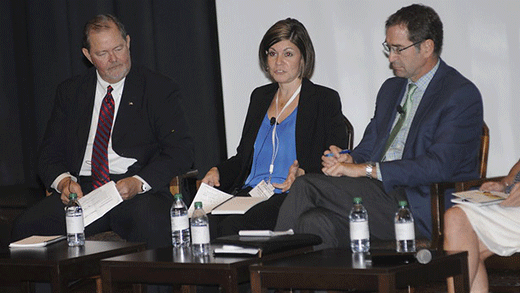
From left, Scott Hutchins, Michelle Calvo-Lorenzo and Nick Austin discuss issues related to innovation in sustainable livestock systems during the 9th meeting of the Global Agenda for Sustainable Livestock. | Download this photo
Experts say ‘positive disruption’ good for livestock industry
Innovations have helped to shape safer, more efficient practices around the world
September 11, 2019
MANHATTAN, Kan. — Like much of agriculture, the world’s livestock industry has seen its fair share of innovation over the past 20 years, dramatically changing the way ranchers raise their animals.
Sometimes, said a group of industry leaders, that innovation creates a “positive disruption.”
“The disruption that is on the horizon is real-time information,” said Nicola Shadbolt, a professor of farm and agribusiness management at Massey University, who was speaking during the 9th annual meeting of the Global Agenda on Sustainable Livestock at Kansas State University.
“A rancher can get access to information that can help them make (an important) decision out on the farm; consumers have access to information when making a purchase. There is power in having real-time information.”
Shadbolt was one of five members of a panel that was speaking about innovation in the livestock industry during the annual meeting, which is being held Sept. 9-13 for the first time in the United States.
Panelist Scott Hutchins, the deputy undersecretary of research, education and economics for the U.S. Department of Agriculture, said some of the positive disruptions he’s seen in the livestock industry has focused on four themes:
- Advanced genetics (such as gene editing and related technologies)
- Digital agriculture
- Artificial intelligence (which is helping scientists find cures for disease more quickly)
- New age whole farm management.
“Innovations are helping to reduce complexity in the livestock industry,” Hutchins said, noting an example of how herbicide tolerant crops have helped to simplify the process of weed control.
“You could call some innovations disruptive, but maybe it’s just bringing the technology from the ‘rich world’ into the smaller countries,” said Nick Austin, the director of agricultural development for the Bill and Melinda Gates Foundation.
Technology, Austin notes, offers opportunities for small farmers to increase their productivity just as larger operations can. New tools and management practices benefit family farms just as well as they may benefit larger corporate farms.
Michelle Calvo-Lorenzo, a technical consultant for animal well-being with Elanco Animal Health, said that people often think of the big breakthroughs in agriculture, such as data technology, artificial intelligence, genomics and biotechnology.
“But,” she says, “the example I like to talk about is one of the great disruptors we see in livestock production, and it’s one of the oldest: manpower…our people. There is a wide range of cultures and religious views on our farms, and there are a lot of factors that make how we work together in this diverse world very complex.”
Calvo-Lorenzo said managing the work force is “social technology,” noting that empowering and valuing workers has a positive effect on livestock “because the human-animal interaction is important to sustainability of the livestock industry.”
Eddy Pesantez, the undersecretary of livestock production in Ecuador, said that his country is hungry for innovation in all agricultural sectors.
“With technology and research, we can target all of the things we need…and it’s a way to fight all of the diseases that we face,” said Pesantez, who addressed the gathering in Spanish.
All of the panelists noted at some point that social media plays a big role in advancing the livestock industry in the United States and around the world.
The Global Agenda for Sustainable Livestock is being held in the United States and on a university campus for the first time ever. The group’s goal is to create dialogue and action in response to the world’s growing demand for meat, eggs and milk, while protecting natural resources.
Learn more about the group at http://www.livestockdialogue.org.

